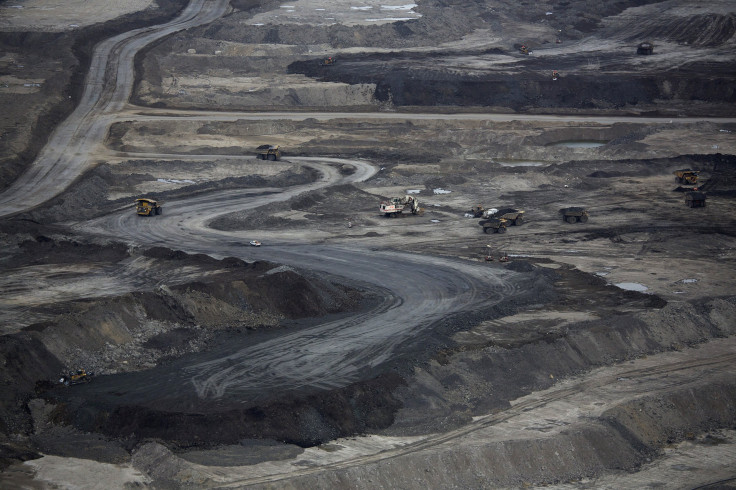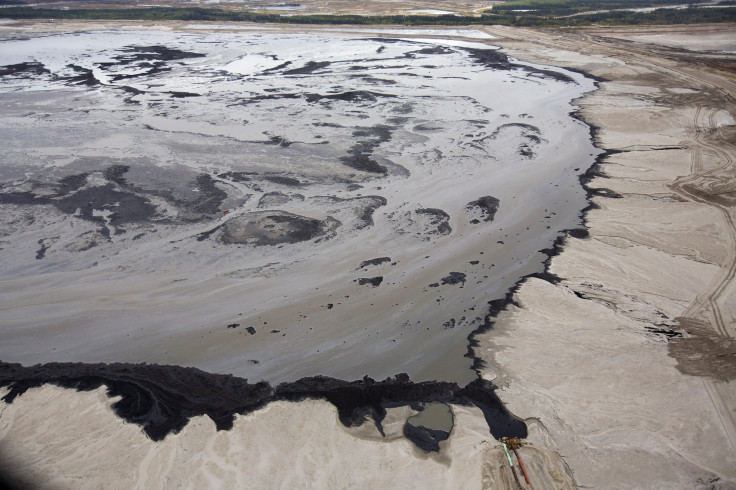Royal Dutch Shell To Abandon Canadian Oil Sands Project Just Weeks After Dropping Arctic Oil Drilling Venture

Royal Dutch Shell PLC said it would abandon another high-cost oil project, just weeks after it abruptly canceled a $7 billion drilling venture in the Arctic. The news arrives as slumping crude oil prices and challenging economics make it harder for oil and gas companies to justify unconventional and risky projects.
The Anglo-Dutch energy giant said this week it would cease construction of a major oil sands project in Western Canada and take a $2 billion writedown. The decision to halt its 80,000 barrel-a-day Carmen Creek project reflects a shaky business environment and other uncertainties, including the lack of pipeline infrastructure needed to move Canadian crude to global markets, according to the company.
“We are making changes to Shell’s portfolio mix by reviewing our longer-term upstream options worldwide, and managing affordability and exposure in the current world of lower oil prices,” Shell CEO Ben Van Beurden said in a Tuesday statement. “This is forcing tough choices at Shell.”
Oil prices have slumped sharply in the last 16 months as crude production far outpaces tepid global demand. Brent crude, the international benchmark, has traded below $50 a barrel in recent months, down by more than half from its 2014 peak. Lorraine Mitchelmore, president of Shell Canada, said last year the company’s oil sands business needs prices at $70 a barrel to meet internal profit standards.
Shell has also cited $70 a barrel as the point at which oil drilled in the Alaskan Arctic could compete in global markets. If prices stayed below $50 a barrel into 2030, however, the offshore venture would be for naught, Ann Pickard, Shell’s top executive for the Arctic, told Bloomberg Businessweek in August.
Shell shocked the energy industry last month when it announced it would stop exploring for oil in Alaska’s Chukchi Sea. The energy giant spent $7 billion over several years on a single offshore well, and early analyses of core samples suggested drillers would find a bounty of oil. But in late September, the company said it did not find sufficient indications of oil and gas to warrant further exploration and that it would seal and abandon the well.
Environmental groups cheered the decision. Activists with Greenpeace this summer tried multiple times to block Shell’s Alaska-bound vessels, citing the threat of potential oil spills to Arctic wildlife and concerns about rising greenhouse gas emissions from burning the offshore reserves. Green groups have long opposed Canadian oil sands development for similar reasons.
Producing crude from oil sands is particularly energy intensive compared to conventional oil projects. The tarry mud-like substance must be mined or melted out of the ground, then thinned with chemicals and natural gas so it can flow through pipelines. Critics argue that ramping up oil production in Western Canada would boost global carbon emissions, which cause climate change.
Climate concerns have fueled opposition to the proposed Keystone XL pipeline, which would ferry crude from Canada’s Alberta province to refineries on the Texas Gulf Coast. TransCanada Corp., the pipeline’s builder, and its supporters say the long-delayed project is critical for expanding Canadian oil sands development and for increasing oil producers' revenue.

Shell is among a handful of oil sands producers to blame the need for pipeline capacity on their decisions to shutter projects. Norway's state-owned oil giant Statoil SA last fall shelved a multibillion-dollar development for at least three years, pointing to rising costs and the lack of pipelines. France’s Total SA in May 2014 suspended its $11 billion Joslyn North Mine indefinitely.
The bigger foe for oil companies, however, remains the sluggish oil prices. Analysts this week are projecting weaker third-quarter results for the Canadian energy sector, which kicks off its earnings season late Wednesday.
Suncor Corp., Canada’s largest integrated oil and gas producer, is expected to report revenue of about 6.9 billion Canadian dollars ($5.2 billion) in the third quarter -- a 33 percent drop from the nearly 10.3 billion Canadian dollars in revenue it generated in the same quarter last year, according to a Thomson Reuters analyst poll cited by the Wall Street Journal.
Suncor and its peers have aggressively cut costs since the start of this year, deferring long-term projects and slashing hundreds of jobs amid the oil price slump. Analysts say cost-cutting in Canada’s oil patch is likely to get harder for many companies, as “the easy money has already been realized,” Raymond James said in a recent preview cited by the Journal. The financial services company forecast a 20 percent drop in spending next year across the entire sector.
© Copyright IBTimes 2024. All rights reserved.











